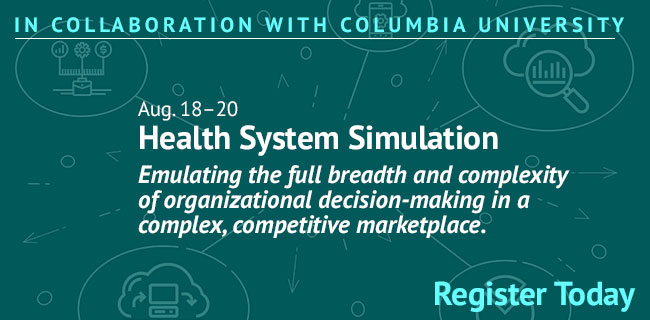
- Program Spotlight:
Prepare for the Next Level of Leadership Today - Rural Hospital CEO Touts Rewarding Leadership Opportunities
- The Emerging Healthcare Leader: A Field Guide
- Recent Grads Can Upgrade to Full Membership for Free
- Genomics in Population Health: The Patient’s Perspective
- Proposed Changes to Physician Payment Rule Address Widening Gap in Health Equity
Prepare for the Next Level of Leadership Today
In today’s fast-paced and disruptive healthcare landscape, organizations need leaders with vision, talent and the ability to influence others. Our Leadership Development Program will equip you with valuable and enlightening information about your personal leadership style, communication and decision-making skills, and the impact you have on others. With virtual live sessions from Sept. 8 to Nov. 3, attendees will assess how their behavioral patterns as a leader affect others, identify barriers that prevent them from taking their career to the next level and develop critical leadership skills.
Worth up to 15 ACHE Face-to-Face Education and continuing medical education credits for physicians, nurses, pharmacists and physician assistants, this program is tailored to executives, including mid-careerists, who provide strategic direction for their organization and who are preparing for the next level of leadership. It’s also ideal for leaders who are responsible for career development and performance coaching for staff. Learn more and register today.
Rural Hospital CEO Touts Rewarding Leadership Opportunities
“I urge people to try rural healthcare—the leadership opportunities are so incredibly rewarding,” says Mary Ellen Pratt, FACHE, in an interview in the July/August issue of the Journal of Healthcare Management. As CEO of 25-bed St. James Parish Hospital in Lutcher, La., Pratt is a champion for rural healthcare in the United States. Read about how her hospital is meeting the special challenges small hospitals face, as well as the rich personal and professional rewards she has realized in rural healthcare.
The authors of another feature in this issue call for a healthcare leadership approach that takes high reliability beyond a safety paradigm to one emphasizing risk identification and mitigation. Additionally, Beth A. Lown, MD, CMO with the Schwartz Center for Compassionate Healthcare, writes about her organization’s response to challenges the pandemic posed for healthcare workers, including its Stress First Aid program.
Also included in this issue are a literature review examining the various leadership styles that can be adopted successfully by clinical professionals who want to transition into a leadership role, and the winning undergraduate and graduate student essays of the 2021 ACHE Richard J. Stull Essay Competition in Healthcare Management. The July/August issue of the Journal of Healthcare Management is available online at ache.org/Journals.
The Emerging Healthcare Leader: A Field Guide
Building a successful healthcare career is more than simply acquiring skills or achieving the right credentials—it requires keen self-knowledge, performance, character and commitment. During this six-week interactive online seminar, participants will learn from the real-life experiences of two accomplished healthcare executives who have achieved significant success in the first decades of their careers.
Geared toward early- or mid-career healthcare leaders or executives transitioning from a clinical to administrative role, this course will explore crucial elements of achieving career goals and provide practical tools and resources to advance professional performance and goals, all while earning up to 6 ACHE Face-to-Face Education credits. Register today.
Recent Grads Can Upgrade to Full Membership for Free
Now through Aug. 30, Student Associates can upgrade to full membership free of charge and experience all of the benefits of being a Member. Full membership means automatically belonging to ACHE’s Early Careerist Network, being able to begin accruing Member tenure toward the one-year requirement to become a Fellow and participating in ACHE’s Leader-to-Leader Rewards Program. Recent graduates can jumpstart their career today by visiting My ACHE to upgrade to Member status. Visit ache.org/Students for more information about upgrading.
Genomics in Population Health: The Patient’s Perspective
The benefits of using genomic science in population health management may be growing increasingly clear to healthcare providers as the data accumulates, but do patients automatically buy in to the approach, and what if they don’t? Two of the organizations profiled in the genomics feature in the July/August issue of Healthcare Executive offer their thoughts on the patient perspective.
Visit HealthcareExecutive.org to read more of the July/August issue of ACHE’s official magazine, as well as exclusive web extras.
Proposed Changes to Physician Payment Rule Address Widening Gap in Health Equity
The Centers for Medicare & Medicaid Services recently proposed changes to its annual Physician Fee Schedule to improve health equity and patient access. The changes are meant to address the widening gap in health equity highlighted by the COVID-19 pandemic and to expand patient access to comprehensive care, especially in underserved populations. The agency is recommending steps that continue the Biden administration’s commitment to strengthen and build upon Medicare by promoting health equity, expanding access to services furnished through telehealth and other telecommunications technologies for behavioral healthcare, enhancing diabetes prevention programs and further improving CMS’ quality programs to ensure quality care for Medicare beneficiaries and to create equal opportunities for physicians in both small and large clinical practices.
To learn about the proposed changes for the 2022 Medicare Physician Fee Schedule, the following resources are available:
- 2022 Medicare PFS Proposed Rule.
- 2022 Medicare PFS Proposed Rule Fact Sheet.
- 2022 Quality Payment Program Fact Sheet.
- 2022 Medicare Diabetes Prevention Program Expanded Model Fact Sheet.


